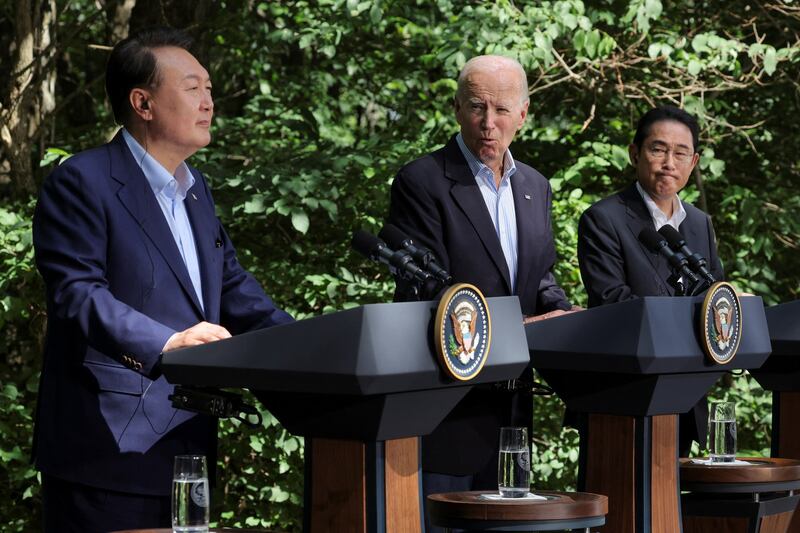South Korea has already established a system that can effectively deter and respond to the North Korean nuclear threat without the need for its own nuclear arsenal, said South Korean President Yoon Suk Yeol, a week after the North unveiled details of its uranium enrichment facility for the first time.
Yoon set out his thoughts on Friday, while on a visit to the Czech Republic, when asked by a reporter if South Korea was seriously considering nuclear weapons.
“Seoul sees beefing up its own defense capabilities as well as strengthening the enforceability of the U.S.-South Korean extended deterrent as the best defense against the North Korean nuclear threat,” he said.
“We established the NCG through the ‘Washington Declaration’ in April last year, and the United States and South Korea are currently promoting nuclear strategic planning as well as joint implementation through the Conventional-Nuclear Integration,” said Yoon, referring to a Nuclear Consultative Group and the strategy of being prepared to survive and respond to a nuclear attack.
The U.S. and South Korea held their inaugural NCG meeting in July last year, when they discussed information sharing, consultation mechanisms, and joint planning and execution to enhance nuclear deterrence against North Korea.
The NCG framework was announced during the bilateral summit in Washington last April against the backdrop of growing demands in South Korea for its own nuclear weapons in light of North Korea’s escalating nuclear threats.
Yoon also highlighted the importance of cooperation between the U.S., South Korea and fellow U.S. ally, Japan.
“Since the Camp David Summit in August last year, the three countries have established a trilateral cooperation system to enhance efforts to promote security and peace in the Indo-Pacific region,” he said.

At their Camp David meeting, the leaders of Japan, the U.S. and South Korea, agreed on several key initiatives aimed at strengthening trilateral cooperation.
These included commitments to enhance joint military exercises, increase intelligence sharing and deepen economic ties. Additionally, the summit produced a joint statement that emphasized the importance of a free and open Indo-Pacific, underscoring the trilateral alliance’s role in maintaining regional stability and countering China’s growing influence.
“As challenges to the international order based on freedom, human rights, and the rule of law grow, especially if they are pursued through force and coercive diplomacy, the need for cooperation between the three countries as partners of values and interests will only increase,” the South Korean president said.
Yoon’s remarks came about a week after the North unveiled details of its uranium enrichment facility for the first time, with its leader Kim Jong Un calling for increasing the number of centrifuges for uranium enrichment so it can increase its nuclear arsenal for self-defense.
RELATED STORIES
[ Satellite photos show expansion of suspected North Korean uranium enrichment siteOpens in new window ]
[ North Korea unveils uranium enrichment facility for the first timeOpens in new window ]
[ Kim Jong Un says North Korea to increase its arsenal of nuclear weaponsOpens in new window ]
Radio Free Asia reported on Thursday, based on analysis of satellite imagery, evidence that a suspected North Korean uranium enrichment facility that may have been toured by leader Kim Jong Un recently has grown significantly since construction was first spotted there in February.
Impact of Russian sanctions
When questioned on whether sanctions against Russia have had any impact on the South Korean economy, Yoon said that since the outbreak of the war in Ukraine, the volume of trade between South Korea and Russia has dropped significantly, and South Korean companies had suffered as a result.
“Nevertheless, as a responsible member of the international community, my government will continue to work in international co-operation to safeguard peace,” he added.
Russian President Vladimir Putin warned South Korea in June that sending weapons to Ukraine would be a "very big mistake" after South Korea said it would consider doing so in response to a pact between Russia and North Korea to come to each other's aid if attacked.
At that time, South Korea announced it would reconsider its policy of not sending arms to Ukraine in response to North Korea and Russia signing a treaty that included a mutual pledge to provide immediate military assistance if either was attacked.
Edited by Mike Firn.
